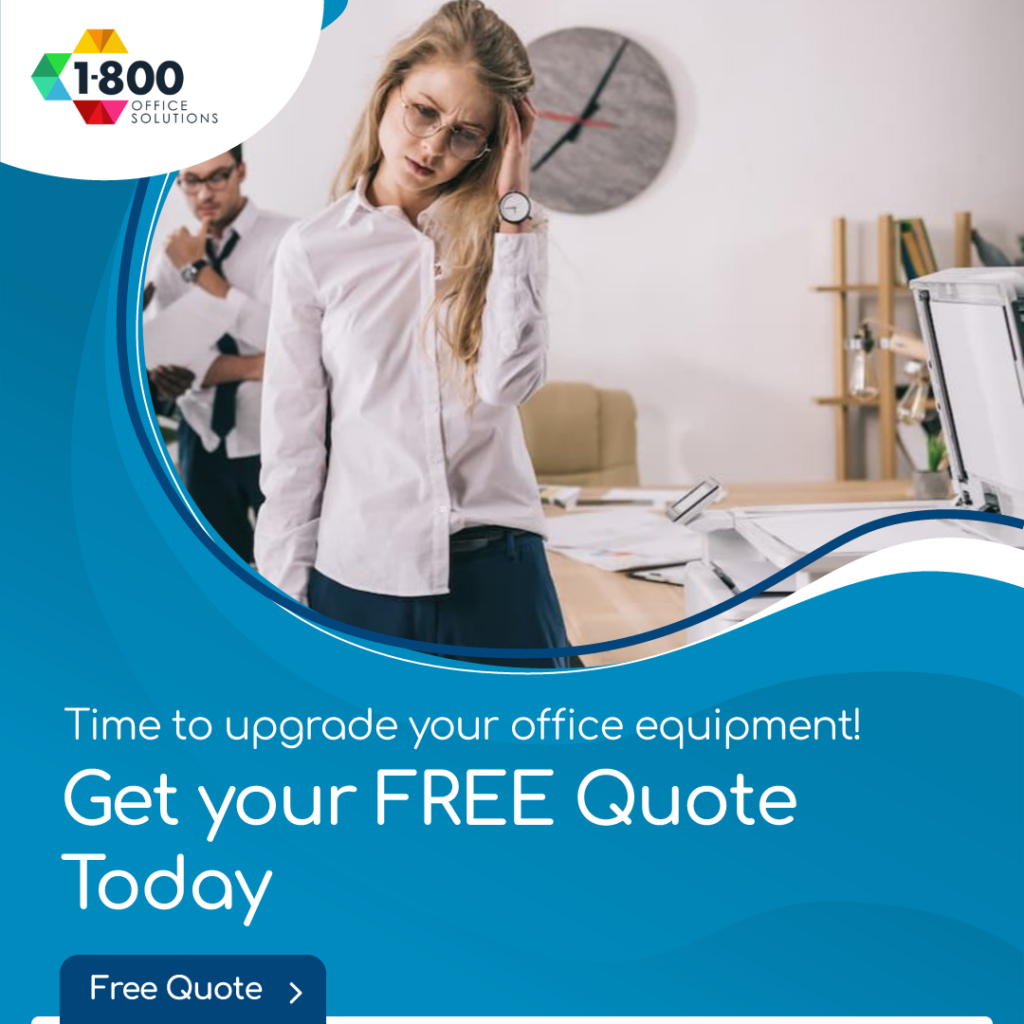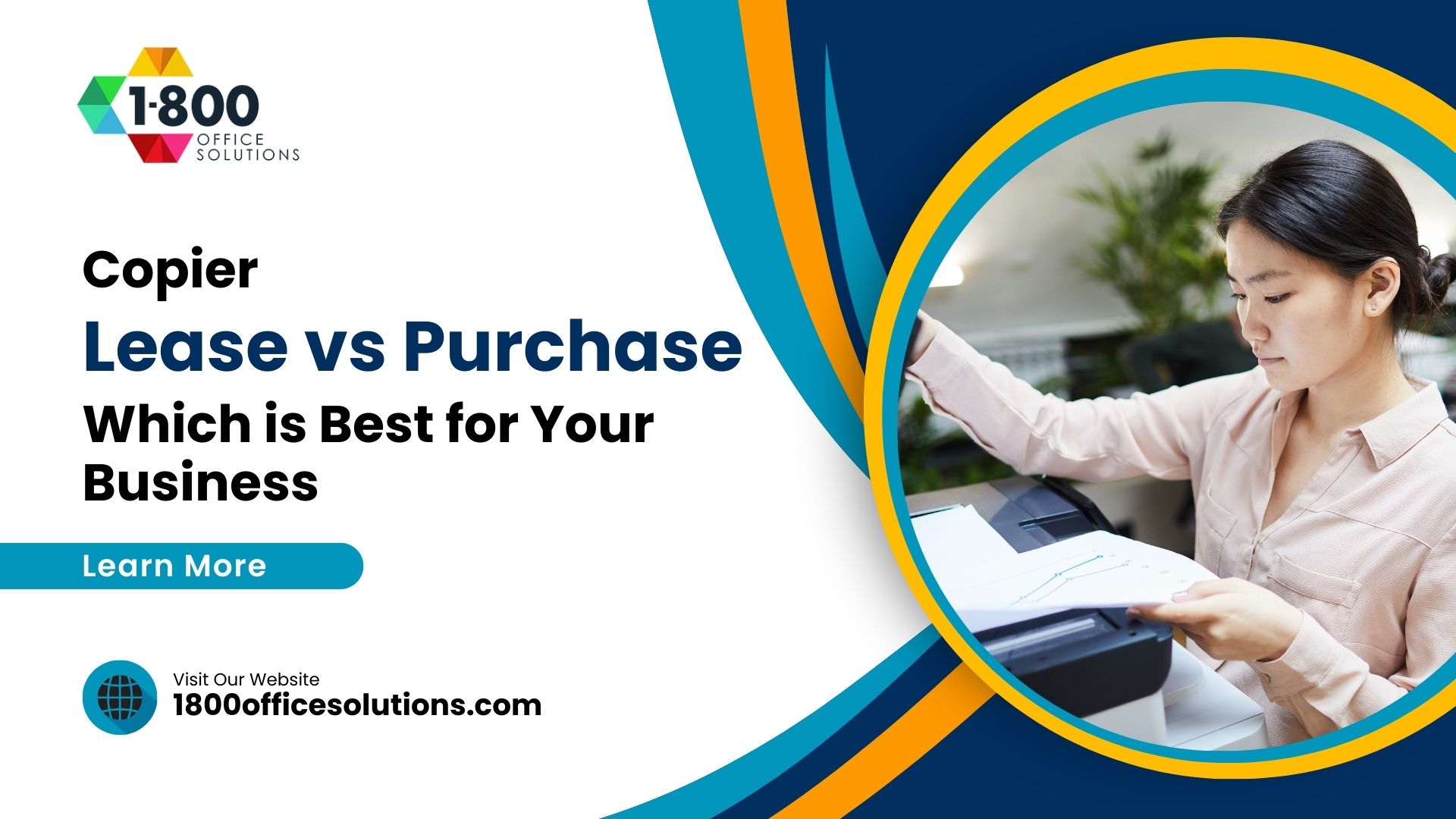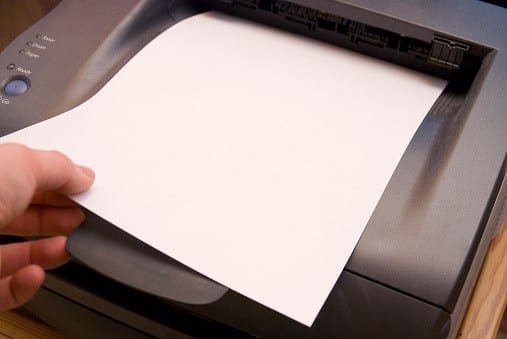Choosing the Right Office Equipment Supplier: Common Mistake Could Be Costing Your Business
Introduction
In today’s fast-paced business environment, the importance of office equipment cannot be overstated. From the humble pen to the multifunctional printer, these tools are more than mere accessories; they are essential components that facilitate daily tasks, enhance productivity, and create a conducive work environment. Whether it’s a marker for a whiteboard during a brainstorming session or a storage cart to organize files, the right equipment makes all the difference.
In this blog post you’ll read a comprehensive guide to choose a better office equipment supplier. Before buying any thing must read this guideline or contact with 1800 Office Solutions for free Quote.
However, a common mistake that could be costly for many businesses is the lack of strategic planning when choosing office supplies. This error often leads to:
- Purchasing unnecessary items
- Overlooking the quality and functionality of products
- Ignoring the compatibility with existing equipment
- Failing to consider the long-term maintenance and clean requirements
Such mistakes not only waste resources but can also hinder the efficiency of the office. Improving Office Space with the Right Items is a crucial aspect that requires careful consideration of various factors including price, quality, and specific business needs. Investing in the wrong box of ink or a printer that doesn’t meet the demands can lead to frustrations and disruptions in the workflow.
In this article, we will explore the intricate process of choosing the right office equipment supplier, focusing on the common mistakes and how to avoid them. We will delve into the factors to consider, from understanding the functionality of each accessory to considering the space and comfort of the desktop. Additionally, we will provide practical tips and insights to help businesses make informed decisions.
Understanding Office Equipment
Office equipment refers to the various tools, devices, and accessories that are essential for the daily operations of a business. These range from basic stationery items to more complex machinery. Understanding the different types of office equipment and their functions is vital for creating an efficient and productive workspace.
Definition and Types of Office Equipment
Office equipment can be broadly categorized into the following:
- Basic Supplies: Includes pens and pencils, notebooks, sticky notes, tape dispensers, post-it notes, rubber bands, clips, stapler, punch, and other desk supplies.
- Technology and Machines: Encompasses computers, monitors, printers, copiers, scanners, fax machines, calculators, and paper shredders.
- Furniture and Fixtures: Comprises office chairs, desks, file cabinets, storage boxes, boards and easels, and other office furniture that are both ergonomic and aesthetically pleasing.
- Cleaning and Maintenance: Includes cleaning supplies, cleaning wipes, trash bins, and other products to keep the office clean and organized.
- Organizational Tools: Features binders, file folders, organizers, planners, calendars, and other tools to organize documents and schedules.
- Specialized Items: School supplies, break room essentials, heavy-duty machinery, external drives, and other specialized tools tailored to specific business needs.
The selection of office supplies and equipment must align with the company’s goals, the nature of the work, and the specific needs of the employees. From a simple pen to a multifunctional copier, each item plays a crucial role in ensuring that the business office is running smoothly.
Importance in Daily Business Operations
The right selection of office supplies is not just about having everything you need; it’s about finding the right solution to keep your business operating smoothly and efficiently. Here’s why office supplies and equipment are indispensable:
- Functionality: Ensures that tasks are performed efficiently with functional tools like permanent markers, scissors, filing systems, erasers, and more.
- Durability: Investing in durable and heavy-duty products like office chairs and storage boxes ensures longevity and reduces the need for frequent replacements.
- Aesthetics: Creating an ample and affordable workspace that is pleasing to the eye enhances employee satisfaction and productivity.
- Accessibility: Offering fast delivery of office products like ink and toner, tape, staples, pads, catalogs, and shipping supplies ensures that operations continue without interruption.
By understanding the extensive line of office basics, from home office essentials to brand-specific items, businesses can create a workplace that is both productive and comfortable.
Common Mistakes in Choosing Office Equipment
Selecting the right office equipment is a critical task that requires careful planning and consideration. However, businesses often fall into common traps that can lead to inefficiencies and unnecessary expenses. Here are some of the most common mistakes and how to avoid them:
Not Asking for Employee Input
- Ignoring Opinions: Employees are the primary users of office supplies and equipment, yet their input is often overlooked.
- Lack of Customization: Without understanding the specific needs of different roles, the selection of office tools may not be optimal.
- Solutions:
- Conduct surveys or meetings to gather employee feedback.
- Consider the functional needs of different departments.
- Choose office furniture and tools that enhance productivity and comfort.
By involving employees in the decision-making process, businesses can create a more ergonomic and productive workspace that caters to the unique needs of each role.
Prioritizing Features Over Needs
- Overcomplicating Choices: Selecting office products with unnecessary features that don’t align with business needs.
- Wasting Resources: Investing in high-end office basics that go beyond the actual requirements can lead to wasted budget.
- Solutions:
- Identify the essential needs before exploring features.
- Focus on affordable and functional tools that serve the purpose.
- Reduce Costs in Daily Operations to Improve Your Bottom Line by aligning the selection with actual business needs.
By focusing on the real needs rather than flashy features, businesses can ensure that every dollar spent on office supplies is a valuable investment.
Choosing Cheaper Options Without Considering Quality
- Compromising Durability: Opting for cheaper office chairs, desks, or copiers without considering the durability can lead to frequent replacements.
- Affecting Performance: Low-quality pens and pencils, sticky notes, or tape dispensers may hinder daily tasks.
- Solutions:
- Focus on quality over price, considering long-term value.
- Invest in durable and heavy-duty office furniture and tools.
- Consider brand reputation and read reviews before purchasing.
Choosing quality over price ensures that the office equipment is durable and provides consistent performance, contributing to a smoothly running business office.
Forgetting About Consumables and Ongoing Costs
- Ignoring Ongoing Expenses: Overlooking the ongoing costs of ink and toner, cleaning supplies, paper shredders, and other consumables.
- Lack of Planning for Maintenance: Failing to consider the maintenance costs of office equipment like copiers, monitors, and printers.
- Solutions:
- Plan for regular delivery of consumables like tape, staples, planners, and calendars.
- Consider fast delivery options to ensure uninterrupted operations.
- Include maintenance and cleaning products in the budget planning.
- Improving Office Space with the Right Items includes considering the total cost of ownership.
By considering the ongoing costs and planning for regular maintenance, businesses can avoid unexpected expenses and ensure that the office continues to operate smoothly.
Tips for Choosing the Right Office Equipment Supplier
Selecting the right office equipment supplier is a multifaceted task that requires careful consideration of various factors. Here are some essential tips to guide businesses in making the right choices:
Consider Price and Quality
- Balance Budget and Value: While keeping costs down is essential, focusing solely on price can lead to compromises in quality.
- Invest in Durability: Look for durable and heavy-duty equipment that offers long-term value.
- Solutions:
- Compare prices and features to find the best value.
- Consider brand reputation and warranties.
- Invest in quality office furniture, office supplies and equipment that align with your budget.
By balancing price and quality, businesses can ensure that they are investing in office equipment that offers both affordability and longevity.
Understand the Functionality
- Know Your Needs: Understand the specific functions required for each piece of equipment, from copiers to desk supplies.
- Avoid Unnecessary Features: Don’t get swayed by flashy features that don’t serve your business office needs.
- Solutions:
- Assess the daily tasks and requirements of each department.
- Choose functional tools like scissors, calculators, sticky notes, and post-it notes that serve specific purposes.
Understanding the functionality ensures that the chosen office products align with the specific needs and contribute to productive operations.
Consider Space and Comfort
- Optimize Workspace: Consider the available space and how the office equipment will fit into the existing workspace.
- Enhance Comfort: Choose ergonomic office chairs, desks, and other furniture that enhance comfort.
- Solutions:
- Measure the space and consider the layout before purchasing.
- Invest in ample and aesthetically pleasing office basics that enhance the work environment.
By considering space and comfort, businesses can create a conducive workplace that supports employee well-being and efficiency.
Consider Your Specific Needs
- Tailor to Your Business: Every business has unique needs, from school supplies to specialized external drives.
- Avoid Generic Choices: Don’t settle for one-size-fits-all solutions that may not align with your business goals.
- Solutions:
- Assess the specific needs of your industry and business operations.
- Choose specialized tools like permanent markers, punch, filing systems, and cleaning products that cater to your unique requirements.
By considering specific needs, businesses can tailor the selection of office supplies to align with their unique goals and operations.
Get Equipment Security Information
- Protect Sensitive Information: Ensure that equipment like monitors, computers, and copiers have proper security features.
- Compliance with Regulations: Adhere to legal and industry standards related to data protection.
- Solutions:
- Research and choose equipment with built-in security features.
- Implement proper protocols for handling and storing sensitive information.
By focusing on security, businesses can protect valuable information and comply with relevant regulations.
Avoiding Common Mistakes
- Learn from Others: Be aware of common mistakes in choosing office equipment and actively avoid them.
- Solutions:
- Refer to the previous section on common mistakes and solutions.
- Implement a strategic approach to selection, considering all aspects from delivery to affordable prices.
By avoiding common mistakes, businesses can make informed decisions that align with their goals and contribute to running smoothly.
What People Also Ask
What are the key factors to consider when buying office equipment?
When buying office equipment, it's essential to balance price and quality, ensuring that you invest in durable and functional items that offer value for money. Understanding the specific functionality of each piece of equipment is crucial, as it helps in selecting tools that serve the actual needs of the business. Space and comfort should also be considered to create an ergonomic workspace. Tailoring the selection to align with unique business requirements, considering security features, and actively avoiding common mistakes are also vital aspects of the selection process.
How can I avoid common mistakes when choosing office equipment?
Avoiding common mistakes when choosing office equipment requires a thoughtful and strategic approach. Involving employees in the decision-making process ensures that their needs and preferences are considered. Prioritizing the essential needs of the business over flashy or unnecessary features helps in focusing on what truly matters.
Quality should never be compromised for the sake of saving money, as it can lead to long-term issues. Planning for consumables and ongoing costs, including maintenance and replacements, ensures that the total cost of ownership is considered, avoiding unexpected expenses down the line.
What are the long-term implications of choosing the wrong office equipment?
Choosing the wrong office equipment can lead to several long-term implications that affect the overall success of the business. Wasted resources due to investing in unnecessary or low-quality items can strain the budget. Reduced productivity may result from inefficient tools that hinder daily operations. Employee dissatisfaction can arise from a lack of comfort and functionality in the workplace.
Additionally, inadequate security features in equipment like computers and copiers can expose sensitive information, leading to potential legal and reputational risks. Making informed and strategic choices in office equipment is vital to avoid these negative implications.
Conclusion
Choosing the right office equipment is a multifaceted decision that impacts every aspect of a business’s daily operations and long-term success. From understanding the importance of balancing price and quality to recognizing the functionality, space, comfort, and specific needs of the business, the process requires careful consideration and strategic planning. Security aspects and the avoidance of common mistakes further add to the complexity of making the right choices.
This guide has provided comprehensive insights and practical tips to assist businesses in making informed decisions. By aligning the selection of office supplies and equipment with the company’s unique needs and goals, businesses can create an organized, efficient, and harmonious environment that supports daily operations and contributes to a thriving future.
In closing, the choices made today in office equipment will shape the efficiency, productivity, and satisfaction of the workplace for years to come. Approach this task with diligence, trust in quality products, and invest wisely in the tools that will support your business’s growth and success. Your investment in the right equipment is an investment in the future of your business. Make it count.












